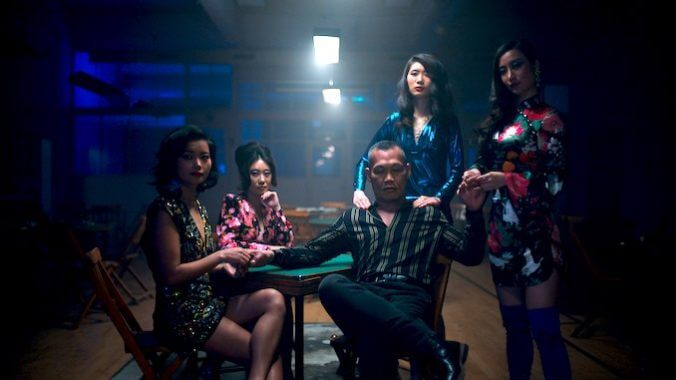Netflix’s Copenhagen Cowboy Is a Vibrant and Stylized Greatest Hits Oeuvre for Nicholas Winding Refn
Photo Courtesy of Netflix
Oh, what peaks and valleys have defined the career of one Nicolas Winding Refn. The Danish provocateur enjoyed success with his blisteringly brutal and intensely stylised pulp fiction, which often turned a probing eye to a specific culture or constructed identity, be it Hollywood, Thai boxing, or Denmark’s criminal underground. But after following up his American breakout Drive with the critically disappointing Only God Forgives (which, charitably, feels like it was written by an infant) and The Neon Demon (the infant tries social commentary), all the hot air Refn got as a result of Drive had more or less deflated. Where has he been since? The same place many disillusioned filmmakers have turned to: streaming.
His Amazon Prime miniseries Too Old to Die Young was an overwhelming descent into moral and masculine rot, filled with hypocrisy and violence-begetting-violence. It was thematically solid and oppressive in tone—and also 758 minutes. Episodes stretched to 90+ minutes and were characterized by long, silent shots of motionless, opaque characters staring with dead eyes. It was punishing, occasionally deadening, and his finest work since Drive.
Cutting the runtime by about 60%, his follow-up miniseries Copenhagen Cowboy continues his exploration of stylized, extra-minimalist narrative design. Inexplicably premiering on Netflix (no other show will be treated more unfavorably by “the algorithm”), Copenhagen Cowboy brings Refn (or, as he’s credited, NWR) back to the unsavory world of Danish crime, his first return trip since closing his Pusher trilogy in 2005. A superstitious woman who housekeeps for her brother’s sex trafficking ring hires a young woman, Miu (Angela Bundalovic, rocking an ‘80s Agnès Varda look), as a “lucky charm,” but when doubts about Miu’s superstitious powers first start to appear, it becomes clear how dangerous the young woman can be. This is merely the trigger point for a story that keeps moving; as Miu ventures out into a hazy labyrinth of multicultural gangs and lost souls, she becomes more elemental than human—which alerts the attention of what can only be described as a castle of vengeful Aryan succubi.
It’s really difficult to review Copenhagen Cowboy because, with its relentlessly abstracted narrative and insistent repetition of the same few visual tricks, you sort of know immediately whether you’re on this train or not. Everything is washed with either vibrant blue or red, none of the dialogue sounds like something a real person would say, and if you drank every time the camera pans a full 360 degrees, you’d end up in a coma. It was an off-putting watch for the 91 minute Only God Forgives; a lot of people will not take to it keeping up across 6 episodes (all of which were available to review).
In a sense, it feels like a Greatest Hits compilation of NWR’s oeuvre: Albanian-Danish gangsters, East Asian martial arts, lost children, carnal spirits, so much bloody neon. Thematically, it also all rings familiar: the commodification of female bodies, male rage against misogyny, the hypocrisy of righteous violence, the sexless sexual obsession of fascism. In its moments of tedium, Copenhagen Cowboy feels like we’re going through a checklist of all of the above, peppering in notes of Scandi comedy and bursts of surreal sound cues.